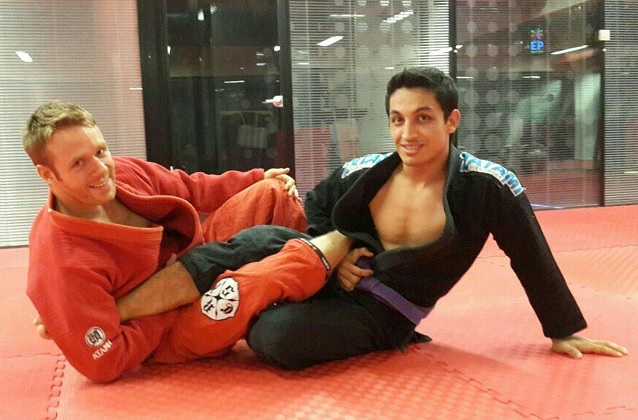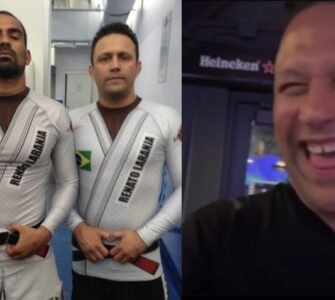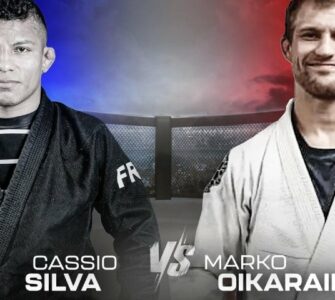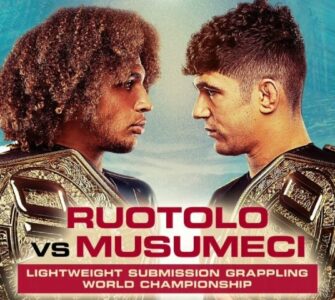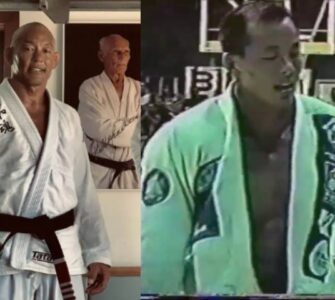Mert Berberoglu is BJJ purple belt and instructor at Ankara BJJ (affiliated with Corvos). He started practicing BJJ together with his instructor Eren Anlar in the year 2008 and founded Ankara BJJ together with Eren. H moved to the US in order to complete his Masters degree at Cornell University, and while there he trained at Cornell Universty Brazilian Jiu Jitsu. He continued practicing BJJ at CUBJJ–the official BJJ team of Cornell. After completing his education in the US, moved back to Ankara and re-joined AnkaraBJJ. In this interview with BJJ Eastern Europe Mert talks about the Turkish BJJ scene, his master Burak and much more.
How did you start training BJJ?
In 2008 Eren Anlar showed up at my Wing Chun academy. Eren is a Brown Belt under team checkmat but when we met he was a bluebelt. I was amazed by the idea that it is actually easy to dominate a non-grappler fighter in a street fight.
I was also excited to see that it is possible to disarm someone without hitting.
At that time the BJJ classes were exlusive to the WC group. After meeting with BJJ I had actually lost my entire enthusiasm towards WC. I was paying the WC instructor just to be able to attend the BJJ classes. After 6 months, there were enough people to open a separate BJJ class. So Eren and me–I was his assistant. Decided to establish AnkaraBJJ. As a three stripe whitebelt under Eren I was inviting many self defence practitioners for BJJ trials. In less than a year there were around like 15 regular people in our team. Most of them were former WC practitioners who left their former art with huge dissapointments Burak Değer Biçer (the head coach of our team Corvos), was a purple belt at that time. He made regular visits to Ankara to bring us one step ahead. He was affiliated to team Brasa. Baran Tubarao was a bluebelt and Ertan Balaban was a four stripe whitebelt, they were at that time together with Burak and working under team Brasa (I am writing these just for your information, it is better to avoid BJJ poitics :))
BJJ politics at that time, separated our ways with Brasa and Burak, but I never lost contact with him. In 2010 I have received my bluebelt from Luiz Manxinha Ribeiro. Eren was promoted to purplebelt in the same day. So we became the first people who received BJJ promotions in the capital city of Turkey.
How did you end up in the USA?
In August 2010, I travelled to Ithaca NY to study Engineering Management at Cornell University. I am an Environmental Engineer btw I got my undergraduate degree from the Middle East Technical University in the year 2009. The Engineering Management program of Cornell is a one year program. I should admit, the academic year 2010-2011 was the best year of my life. It was extremely satisfying in terms of self development. I studied really hard but never compromised from my training.
Also never compromised from partying (being in college is a lot of fun). I also enjoyed the lovely nature in Ithaca. It was the year that I trained with CUBJJ (Cornell University BJJ). We were around 10 higher belts (there was one purple belt Taylor Wollman)
The classes were given by the highest ranked person. I also have given some classes when I was there. But the most important thing I gained in CUBJJ was the technical diversity I was exposed to. There were many students coming from all over the states from different academies and all with different styles. It was the place where I learned to spin from the lasso to catch the opponent into a triange or omoplata, do the straight armbar from the side control and pass the spider guard
In February 2011, I fought in the North East Grappling tournament and gained 2nd place in the intermediate division.
I won my first fight and lost in the second with an ACL injury from the lock down position. It was my right knee this time.
I started to train after 1 month of rest. I love that you can still train and even fight in BJJ despite your injuries. After my graduation I spent the entire summer in Ithaca training with Nicholas Tsai (a legitimate blackbelt who came to Cornell for his post doc study). He tought me really good tricks which i still use when I roll often. I came back to Turkey in September 2011.
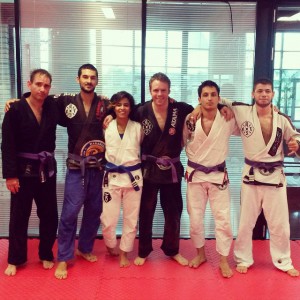
Ankara BJJ
How did you start teaching BJJ?
I took the responsibility of sustaining the team after Eren Anlar has left Turkey to train in Brazil. Together with his leave, we became affiliated to team Corvos. And I can say, it was one of the best decisions that I took through my BJJ journey.
having a common goal and a vision in jiu jitsu carries you to a different level.
In the year 2013-2014 ankarabjj brought 9 IBJJF medals. Ufuk Işık (Bluebelt at AnkaraBJJ – Corvos Ankara) received a gold medal in Rome after successfully defeating two opponents in Master 1 Ultraheavy divison.
I received my purple belt (after staying in blue belt for four years) from Burak Değer Biçer on 3rd May 2014
I am not very assertive as a competitive fighter, yet I am assertive as an instructor. People from other academies get shocked when they roll with my 4 month whitebelts. I always teach with my heart, as if I am teaching to my own brother/sister. I love teaching basics with details.
From your experience, how different is the training mentality between Turks and Americans for example? (For competitors and recreational students)
Since I did not train a lot with the Europeans, I will compare Turkey with the US.
In the US the BJJ market is well established compared to Turkey’s barely developing market; therefore, it is not very easy to make a just comparison, yet here is my best:
According to my teaching experiences, I can say that many Turkish people do not like to drill. Once they have understood a technique, they usually believe that it is done and want to move to the next. They have a desire to learn as much techniques as they can in a short period of time. The instructors should relentlessly remind them to do more repetitions of the technique. This is valid for both competitors and recreational students.
American people, instead, are happy with having few strong tools that can make them succeed over and over again; and they like to drill these a lot. I believe their ability to excel a skill by focusing is coming from their culture.
Another difference between the athletes of these two cultures is their regularity in training. Turkish competitor students train less regularly when compared to the competitors in the US. This may be due to our relaxed-predestinarian culture as well as lack of resources that the Turkish BJJ competitors have in Turkey. American people, however, are extremely committed when the business gets more serious. Once they commit themselves, they go until the end.
The situation is other way around when the subject is the recreational students. In the US there are many recreational BJJ classes which last around 40 minutes. The people train in these academies think that they learn, but actually go around in circles. They will tell you that they have been training BJJ for a long period of time but still cannot execute a regular armbar or a cross-collar choke.
In Turkey many of the practitioners do BJJ just for fun, yet still do it in an efficient way. Usually the BJJ classes, even the recreational ones, last at least 1.5 hour or 2 hours. At my academy we train 2 hours/day in weekdays and 3 hours/day on Saturdays and Sundays.
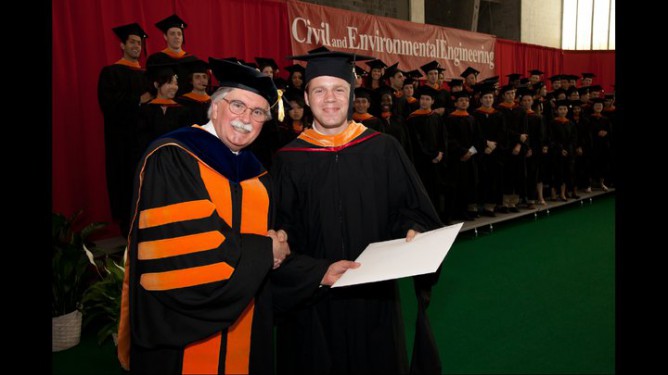
Mert graduated from the prestigious Cornell University
What do you think about the growth of BJJ in Turkey? What are threats and opportunities for BJJ there?
I am optimistic about Turkey’s market. I think we are getting there. There are already several teams growing in different locations, many blue belts, several purple belts and a few brown and black belts—I am ignoring the fake ones, for which also I have some words to say.
BJJ in Turkey has 10 years of history—since 2004. But majority of its development happened in the last five years and in the last couple of years it started to grow exponentially. Many groups that train traditional martial arts, shifted towards training BJJ and MMA with a greater appreciation of ground fighting skills.
Connecting Asia and Europe, Turkey has a great potential for global competitions where fighters from Europe, Middle East, Asia and Northern Africa can meet and test their skills among each other. Visa obligations is a problem for many non-European competitors to join the competitions in the Europe. Therefore, I believe Turkey would be a perfect place for an IBJJF competition to unite fighters from the three continents.
I have two main concerns regarding the growth of BJJ in Turkey: (1) increasing number of fake black belts and (2) lack of understanding of BJJ ethics.
Let’s start from the first; as I said previously, many has shifted from their traditional styles to BJJ, but some of these people failed to take their black belts off and wear a white belt. There are people who only wear their white belt just to be able to attend a BJJ black belt’s seminar. After the class, when everyone is taking photos, they disappear. Then you see pictures of them, wearing a black belt on a Koral Gi and showing arm bars to their students.
We laugh a lot when they post videos on facebook, again wearing black belts, but failing to execute the basics. This is a major threat because there are a lot of students, with great potentials, who spend years of training with them. Think about the disappointments of these students when they realize they lost years of mat time by practicing sloppy techniques. If they had been trained with the correct people, these kids, could have been among the first IBJJF champions of Turkey.
BJJ ethics is another big deal. Raising a person to higher belts is not an easy job. It requires patience, knowledge, time and effort. Inviting someone else’s student to your team, however, is extremely easy. In Turkey, unfortunately, there are people who call themselves “leaders” but so indecent that they invite readily grown up higher belts from other teams. They either attempt to charm the athletes of other teams by making tangible offers or try to disunite the competitor teams with gossips.
This is a major threat to Turkey’s BJJ market, because such behavior damages the relationships between teams in a way that they cannot be repaired. Academy owners should always respect the endeavors of other instructors and be oriented towards raising new students. It may be tempting to have another higher belt at your academy without spending any effort, but then you should ask this question to yourself: “Do I want to have loyal students at my academy? Or am I basically looking for Creonte’s?”
I believe, we see this problem in Turkey because the market is very new and BJJ culture is not yet mature. I heard about some academies in the Europe that do not accept students from other schools and it really makes sense; if they are talking shit about their former coach, who brought them a couple of belts up, they can very well turn against their new instructor too!
Despite all these problems, I believe all the leaders will learn their lessons and fix their behavior in the future.
Tell us more about your instructor Burak Değer Biçer and the Corvos team
Burak is the first BJJ black belt of our country—I am not counting the Turkish black belts living abroad—and many successful BJJ fighters of Turkey are trained by him. He is extremely dedicated to the development of his students and uses all his resources for their growth.
He is a black belt who coaches during tournaments, one by one, all of his students (even all the whitebelts)—usually we are 20-30 people in a targeted competition. After every tournament he gets a hoarse voice. It’s not only him though, it’s the entire team; when people see a crowd cheering and shouting in the corner of a white belt, they know that this is Corvos.
I admire his teaching style and outlook on BJJ. It’s the culture established by him, what makes Corvos—the first BJJ and MMA team of Turkey—one of the fastest growing teams in the region.
It has been only four years since Corvos was established in 2010. Until now we have academies in Azerbaijan, Russia, Ukraine, Iran, Greece and several locations in Turkey—Istanbul, Ankara, Izmir, Diyarbakir and Canakkale.
Corvos has an excellent culture for growth. All the students are oriented towards sharing and developing others. Once you join the family, you will have many brothers who are eager to teach you the art, with patience and enthusiasm. When you grow up to higher belts, however, the responsibility increases; now it is time for you to take care of your lower belts.
People who are not willing to share, fail to remain in the team. Although Corvos grows relatively fast, its vision is to grow by remaining as a strongly attached family. We value quality of the individuals more than the number of people that appear in the pictures.
What is next for you and your team in 2014-15?
At Corvos Ankara, our nearest target is Moscow Open (7-8 November). I together with two of my students will be there and a few more guys from Istanbul will join us.
Two of my students will be fighting also in Lisbon for the IBJJF European Championship.
On the 4th of November, Master Luiz Palhares (coral belt) will be giving a workshop at our academy in Ankara. He will be the first coral belt giving a workshop in Turkey.
Between 23rd of November and 13th of December, Burak Değer Biçer will be teaching a seminar in Sao Paulo at the academy of Marangoni Brothers. He was invited after Marangoni Brothers visited Corvos Academy in Istanbul and impressed by Burak’s students. This is actually a significant achievement for BJJ in Turkey. Burak will be the first Turkish BJJ instructor who has given a BJJ workshop in Brasil.
If you want to thank somebody or sponsors, feel free
Thanks a lot to Burak Değer Biçer and Eren Anlar who always inspired me for developing myself as a dedicated BJJ practitioner and teacher. Also thanks to all of my team mates and students. Especially, Gizem Bekaroğlu, my blue belt girlfriend . She never withhold her support from me and our team.
Thanks Mert and all the best
Thank you very much for the interview, you guys are awesome!
Warmest regards from Turkey,
Mert Berberoğlu

